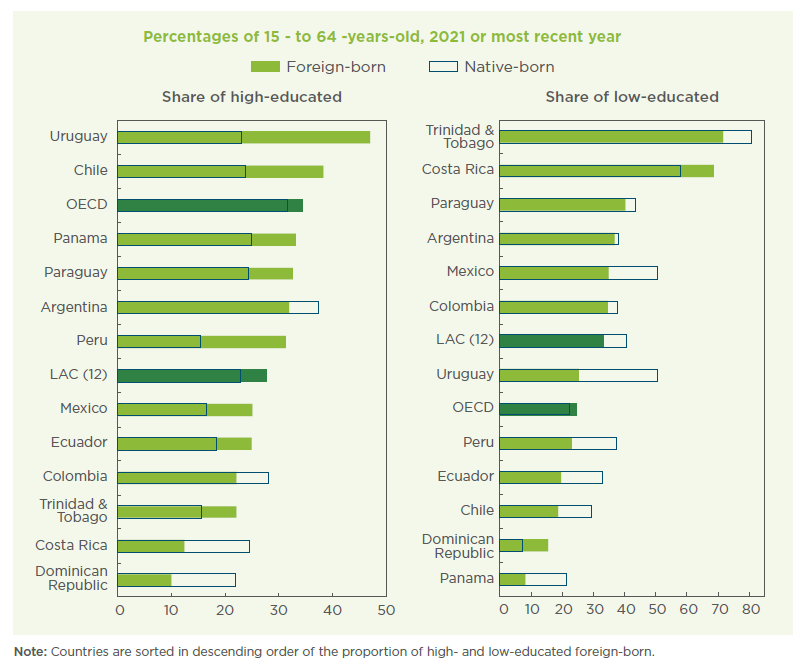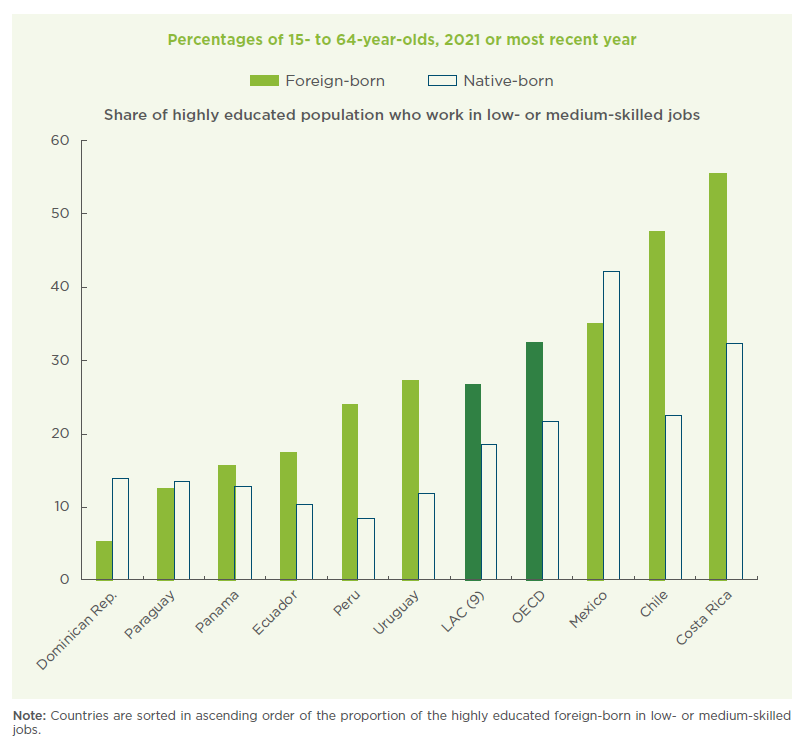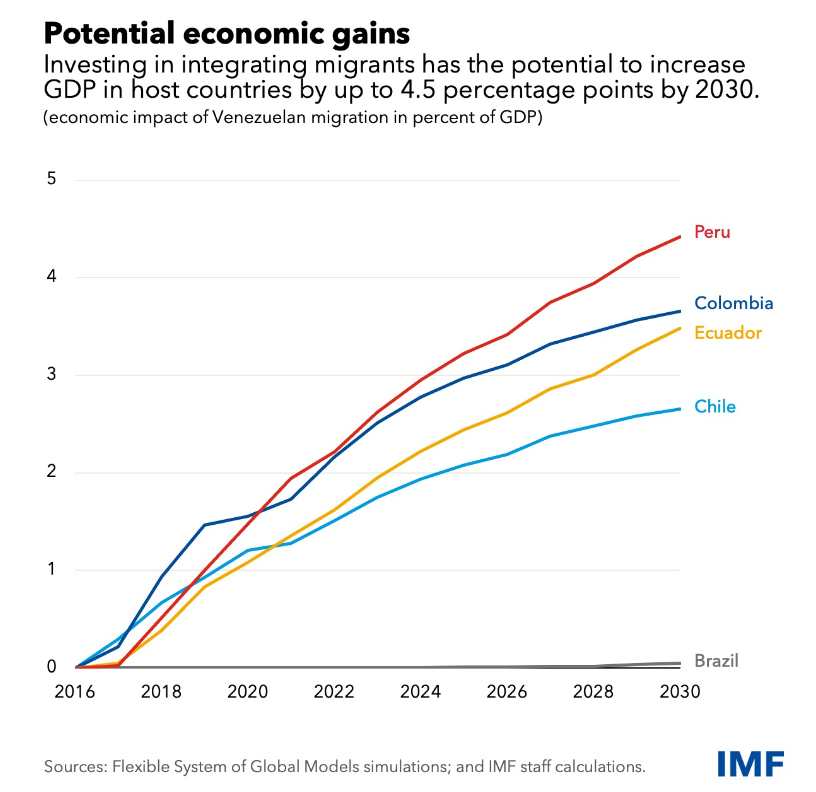“Migrants come to take our jobs.” “Migrants increase crime.” “Migrants are not educated.” “Migrants are an expense for my country.” “Migrants have no right to live in my country.”
Phrases like these are frequent on social media, the media, and public conversation in many of the countries in our region. As the studies of our Public Perceptions Laboratory on Migration indicate, xenophobia is on the rise in Latin America and the Caribbean, mainly based on myths and false beliefs.
On this December 18, “International Migrant Day”, at the Migration Unit we want to respond to some of these fears with examples of the positive impacts that migration has on their host communities. Many times, the lack of information about the true impact and benefits of migration leads to the emergence of prejudices and false beliefs such as those mentioned.
Indeed, many times these benefits are not immediate and the integration process can be long and require investments from the governments of the recipient countries in the short term. But in the medium and long term we know, from the available scientific evidence, that an adequate integration of the migrant population is positive both for migrants and for their host countries and their countries of origin.
Migration is positive for host countries
In the medium and long term, migrants contribute to an expansion of investment and productivity, an increase in wages, the specialization of native workers, and accessibility to personal and care services. The experience of receiving countries from other regions and with a long migratory history shows that in the long term, the impact of migration is positive for the economies of the receiving countries.
In the United States, for example, it is possible to measure the impact of migration on the workforce by considering the number of migrants who settled in each state. The data shows that a 1% increase in labor due to a larger foreign workforce produces an increase in the average salary of between 0.4% and 0.5%.
In our region, although the first studies are just being prepared, the experience of Ecuador shows that (until 2019) the arrival of almost half a million migrants had not had a perceptible negative impact on the hiring of the local population in the labor market or their participation in it.
A study by the IDB on the experience of the Dominican Republic shows that a 1% growth in migrant women is associated with an increase of 1.5 hours of work by highly qualified women who have dependents compared to other equally qualified women but without dependents.
These are just some examples of how, contrary to what myths say, migration is positive for employment, wages, and the labor market of receiving economies.
On average, migrants in Latin America and the Caribbean have higher educational levels than natives. The study “How do migrants fare in Latin America and the Caribbean” analyzes the situation of the migrant population in 12 Latin American countries for which data is available. The results show that, in 8 of the 12 countries analyzed, the proportion of working-age people with a high educational level is higher than the local population and the proportion of working-age population with a low educational level is lower among migrants than among natives.
Participation of the working-age population with high and low educational levels

Additionally, and due to different obstacles to the labor integration of the migrant population in the labor market, the same study shows that, although migrants are more likely to be highly qualified, they frequently work in low-skilled jobs, wasting their capabilities and the possibility of contributing to a greater extent to the economies of the host countries.
Overqualification for migrants and natives

There is also no evidence that an increase in migration leads to increased crime. When we analyze the public conversation on immigration issues, people’s main concern is security, usually associated with negative feelings and frequently with a xenophobic tone. This is fundamentally due to an association between the arrival of migrants and crime. However, the available information does not offer a direct relationship between migration and insecurity.
A study by the Migration Policy Institute and the Brookings Institute on data from Colombia, Peru and Chile for 2019 concludes that Venezuelan migration did not lead to an increase in crime in the region. In Chile, for example, although in 2019 the Venezuelan population represented 2.4% of the population, only 0.7% of crimes had been committed by people of that nationality. In Peru, only 1.9% of imprisoned people were foreigners while the Venezuelan population alone reached 2.9% of the total population. And finally, in Colombia, 2.3% of people arrested for violent crimes were Venezuelans when they represented 3.2% of the population.
The arrival of migrants is positive for the economies of the host countries in the long term. Although the socioeconomic integration of the migrant population requires an important investment in the short term for the economies of the receiving countries, full integration allows them to contribute positively in the medium and long term. An IMF study estimates that, with the corresponding support and policies, Venezuelan migration has the potential to increase the GDP of its main recipient countries (Chile, Colombia, Ecuador and Peru) between 2.5 and 4.5 percentage points towards 2030.

An analysis of the fiscal impact of the migrant population in OECD countries shows that migrants contribute more in taxes and social contributions than they receive in individual benefits. According to the work, the cumulative impact of the arrival of migrants to OECD countries during the last 50 years on average tends to zero and very rarely exceeds 0.5% of GDP. In countries like Switzerland or Luxembourg the impact is positive and represents 2% of GDP.
Towards an integration of the migrant population that benefits everyone
Millions of migrants in countries throughout the region work every day in strategic positions in local companies, consume and give life to the economies of their destination cities, and are at the forefront of enterprises that offer vital products and services for the daily lives of our families.
The integration of the migrant population is a big but possible challenge. With the appropriate tools and resources, the countries of Latin America and the Caribbean can transform the challenges of migration into an opportunity for their development.
At the Migration Unit, we will continue generating knowledge and evidence about the impacts and benefits of migration for host countries.


Leave a Reply